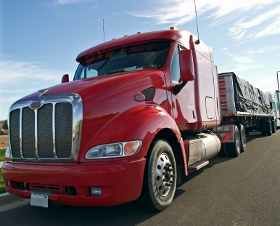Reefer Drain Plugs
Topic 15016 | Page 1

I'm interested I this one. We've never even heard of reefer plugs.
Reefer:
A refrigerated trailer.

The water dripping is compressor condensation run-off and has nothing to do with the drain plugs. Those holes are for clean-outs, so water completely evacuates from the trailer.
If you go to a shipper requiring the holes to be plugged, they should provide you with 4 throw-aways. In my 3+ years of running reefer , I had to plug the drain holes only once, and for apples. The holes plugged or unplugged doesn't discernibly effect temperature.
I have many backhauls at subzero settings, (-20) and never had to plug the holes.
Shipper:
The customer who is shipping the freight. This is where the driver will pick up a load and then deliver it to the receiver or consignee.
Reefer:
A refrigerated trailer.
HOS:
Hours Of Service
HOS refers to the logbook hours of service regulations.
The water dripping is compressor condensation run-off and has nothing to do with the drain plugs. Those holes are for clean-outs, so water completely evacuates from the trailer.
That's not the water I was talking about. This was actually diluted blood, from the chicken parts I was hauling.
HOS:
Hours Of Service
HOS refers to the logbook hours of service regulations.
The water dripping is compressor condensation run-off and has nothing to do with the drain plugs. Those holes are for clean-outs, so water completely evacuates from the trailer.
That's not the water I was talking about. This was actually diluted blood, from the chicken parts I was hauling.
I responded to what you wrote in the original post: I still had "water" dripping. So water in quotes meant chicken blood? Who'd a thunk it?
HOS:
Hours Of Service
HOS refers to the logbook hours of service regulations.I haul produce out of the new Jersey ports all the time. The only time they require plugs is on produce in the winter. After april... no more plugs.
Del monte said it has to do with both the condensation and the outside air contaminating the inside temps. I've had to plug both bananas and pineapple in winter.. but was not told to do cherries. Guess what... Walmart rejected the cherries... and to this moment I never considered it could have been the plugs.
They also claim that having the fruit too close to the walls gets the chill inside the fruit and damages it from within.
For balance those loads should be single double single and spin them or you could be over on tandems.
These are usually done on SLDC loads and I've just learned to ask about the plugs. Not once have I needed to do it for meat
Tandems:
Tandem Axles
A set of axles spaced close together, legally defined as more than 40 and less than 96 inches apart by the USDOT. Drivers tend to refer to the tandem axles on their trailer as just "tandems". You might hear a driver say, "I'm 400 pounds overweight on my tandems", referring to his trailer tandems, not his tractor tandems. Tractor tandems are generally just referred to as "drives" which is short for "drive axles".
Tandem:
Tandem Axles
A set of axles spaced close together, legally defined as more than 40 and less than 96 inches apart by the USDOT. Drivers tend to refer to the tandem axles on their trailer as just "tandems". You might hear a driver say, "I'm 400 pounds overweight on my tandems", referring to his trailer tandems, not his tractor tandems. Tractor tandems are generally just referred to as "drives" which is short for "drive axles".
HOS:
Hours Of Service
HOS refers to the logbook hours of service regulations.
Driver2, I have been pulling reefers for 4 months now so I'm as rookie as they come, n yes I saw the plugs being push out with water pressure in a BB when I was getting a washout, I asked them what r those n they explained to me what they were n how they were use by customers, so I was informed by a customer when ever they were needed THEY supply them,.....out
How common are these things, and how often are they needed ?
I just hauled a chicken load and despite the trailer being at 20 degrees, I still had "water" dripping. .. notes on the load said to install the plugs, but dispatch said they wouldn't be needed, the shipper didn't install them. A friend of mine from C.R. said not to worry about them.
What is the concensus ? Is that something I should put in my tool box?
Shipper:
The customer who is shipping the freight. This is where the driver will pick up a load and then deliver it to the receiver or consignee.
Reefer:
A refrigerated trailer.
HOS:
Hours Of Service
HOS refers to the logbook hours of service regulations.
I've only ever seen the plugs once and they were supplied by the customer. I was hauling paper rolls and apparently they don't want any moisture getting near thier paper. So they put the plugs in I just took them out when I swept the trailer out later.
New Reply:
New! Check out our help videos for a better understanding of our forum features

















Preview:








 TT On Facebook
TT On Facebook
How common are these things, and how often are they needed ?
I just hauled a chicken load and despite the trailer being at 20 degrees, I still had "water" dripping. .. notes on the load said to install the plugs, but dispatch said they wouldn't be needed, the shipper didn't install them. A friend of mine from C.R. said not to worry about them.
What is the concensus ? Is that something I should put in my tool box?
Shipper:
The customer who is shipping the freight. This is where the driver will pick up a load and then deliver it to the receiver or consignee.